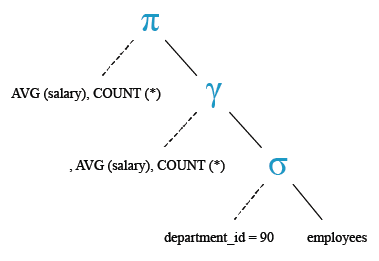PostgreSQL Aggregate Functions and Group By: Get the average salary and number of employees working in a particular designation
5. Write a query to get the average salary and number of employees working in the department which ID is 90.
Sample Solution:
Code:
-- Calculate the average salary and count of employees in the department with ID 90
SELECT AVG(salary),count(*)
FROM employees
WHERE department_id = 90;
Explanation:
- This SQL query is designed to calculate the average salary and count of employees within the department with ID 90.
- The AVG() function is an aggregate function in SQL that calculates the average value in a column.
- salary is presumably a column in the employees table that holds the salary information for each employee.
- count(*) is used to count the number of rows returned by the query, effectively counting the number of employees in the department with ID 90.
- department_id is likely a column in the employees table that identifies the department each employee belongs to.
- The WHERE clause filters the rows to include only those where the department_id is equal to 90, representing the department with ID 90.
- The query calculates the average salary and counts the number of employees for all rows in the employees table that belong to the department with ID 90.
Sample table: employees
+-------------+-------------+-------------+----------+--------------------+------------+------------+----------+----------------+------------+---------------+ | EMPLOYEE_ID | FIRST_NAME | LAST_NAME | EMAIL | PHONE_NUMBER | HIRE_DATE | JOB_ID | SALARY | COMMISSION_PCT | MANAGER_ID | DEPARTMENT_ID | +-------------+-------------+-------------+----------+--------------------+------------+------------+----------+----------------+------------+---------------+ | 100 | Steven | King | SKING | 515.123.4567 | 1987-06-17 | AD_PRES | 24000.00 | 0.00 | 0 | 90 | | 101 | Neena | Kochhar | NKOCHHAR | 515.123.4568 | 1987-06-18 | AD_VP | 17000.00 | 0.00 | 100 | 90 | | 102 | Lex | De Haan | LDEHAAN | 515.123.4569 | 1987-06-19 | AD_VP | 17000.00 | 0.00 | 100 | 90 | | 103 | Alexander | Hunold | AHUNOLD | 590.423.4567 | 1987-06-20 | IT_PROG | 9000.00 | 0.00 | 102 | 60 | | 104 | Bruce | Ernst | BERNST | 590.423.4568 | 1987-06-21 | IT_PROG | 6000.00 | 0.00 | 103 | 60 | | 105 | David | Austin | DAUSTIN | 590.423.4569 | 1987-06-22 | IT_PROG | 4800.00 | 0.00 | 103 | 60 | | 106 | Valli | Pataballa | VPATABAL | 590.423.4560 | 1987-06-23 | IT_PROG | 4800.00 | 0.00 | 103 | 60 | | 107 | Diana | Lorentz | DLORENTZ | 590.423.5567 | 1987-06-24 | IT_PROG | 4200.00 | 0.00 | 103 | 60 | | 108 | Nancy | Greenberg | NGREENBE | 515.124.4569 | 1987-06-25 | FI_MGR | 12000.00 | 0.00 | 101 | 100 | .......... | 206 | William | Gietz | WGIETZ | 515.123.8181 | 1987-10-01 | AC_ACCOUNT | 8300.00 | 0.00 | 205 | 110 | +-------------+-------------+-------------+----------+--------------------+------------+------------+----------+----------------+------------+---------------+
Output:
pg_exercises=# SELECT AVG(salary),count(*)
pg_exercises-# FROM employees
pg_exercises-# WHERE department_id = 90;
avg | count
--------------------+-------
19363.333333333333 | 3
(1 row)
Relational Algebra Expression:
Relational Algebra Tree:
Go to:
PREV : Write a query to get the maximum salary of an employee working as a Programmer.
NEXT : WWrite a query to get the highest, lowest, total, and average salary of all employees.
Practice Online
Have another way to solve this solution? Contribute your code (and comments) through Disqus.
What is the difficulty level of this exercise?


